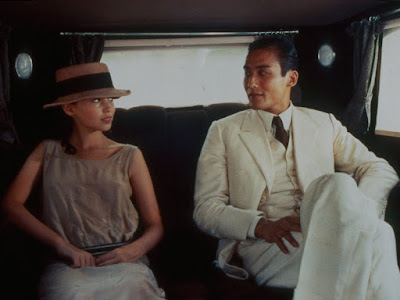 |
| From the 1992 film of The Lover |
Q1: The book takes place in French Indochine (Indo-China), a French colony since 1887 (which is today Vietnam). People of many races and cultural identities live here, including the narrator, who is the child of a French schoolmistress. How does race play a factor in this society? How is she seen by others, including her lover, the mysterious Chinese businessman? Also, how does she see herself in relation to others?
Q2: How is the narration (and the Narrator) of this book very similar to Kokoro? What similarities do they have in their relationship to the area and to the way they tell their story? Why do you think many postcolonial works might adopt this narrative style?
Q3: On page 34, the Narrator writes that "And I'll always have regrets for everything I do, everything I've gained, everything I've lost, good and bad..." Why do you think her affair with 'the Lover' begins this endless stream of regrets? What does she feel she has gained and lost? And why might it still affect her so many decades later (since she's writing the book in old age: Duras wrote it in her 70's about her childhood)?
Q4: On page 54, she describes the stiflingly cruel atmosphere of her family, writing that "It's a family of stone...Every day we try to kill one another, to kill. Not only do we not talk to one another, we don't even look at one another." What clues do we get for the family's disfunction? Is it their mother? The status? The country itself? Or is this being colored by her regrets in the future?
No comments:
Post a Comment